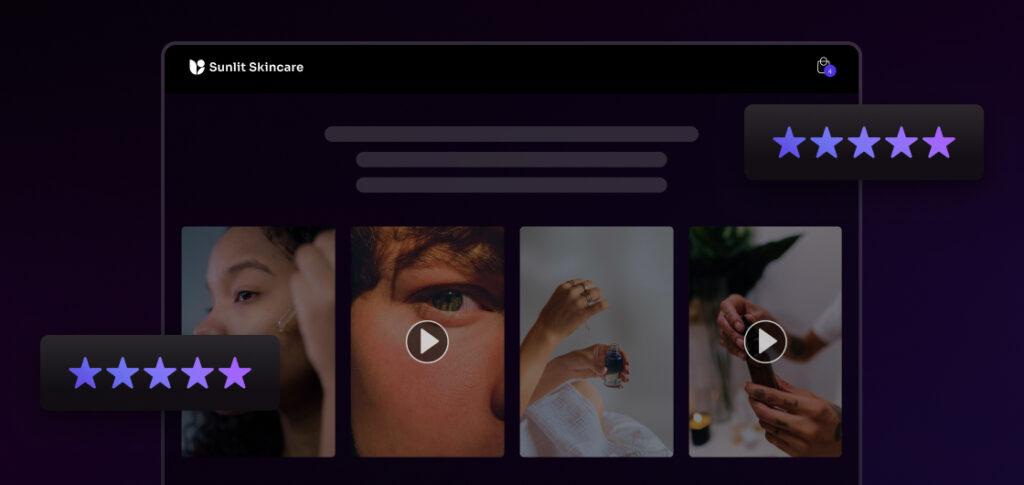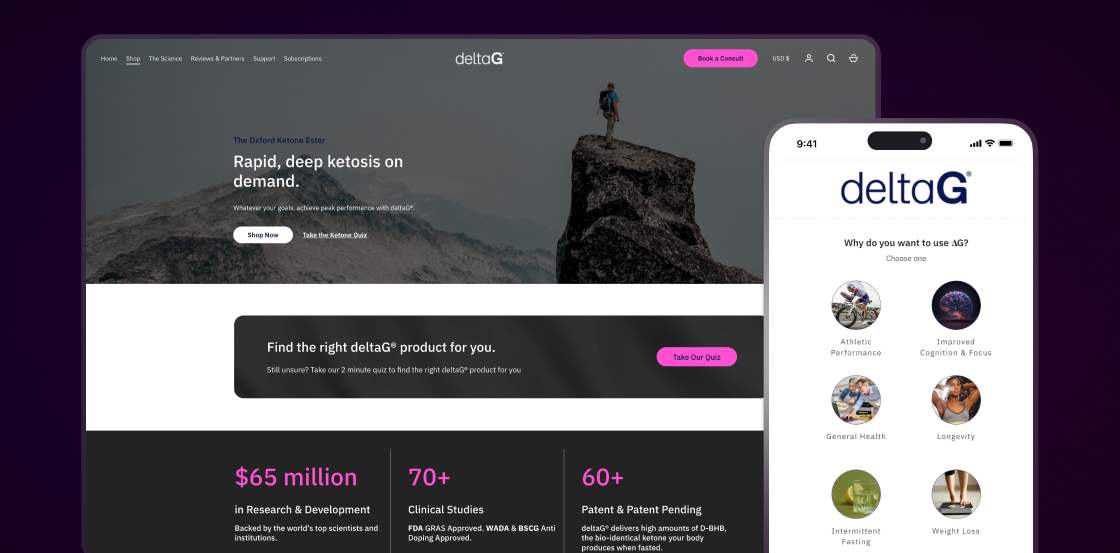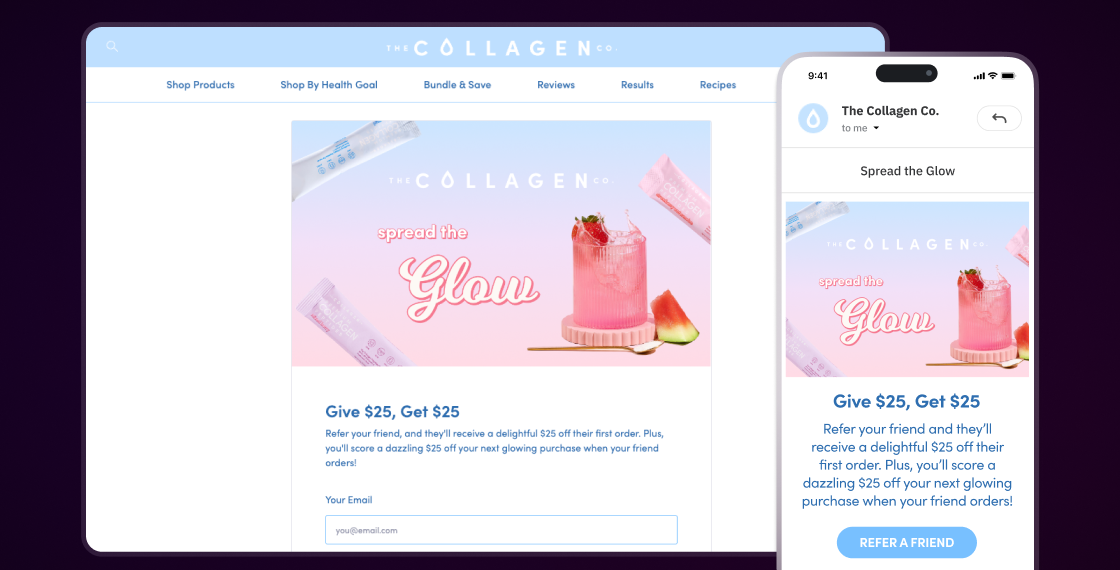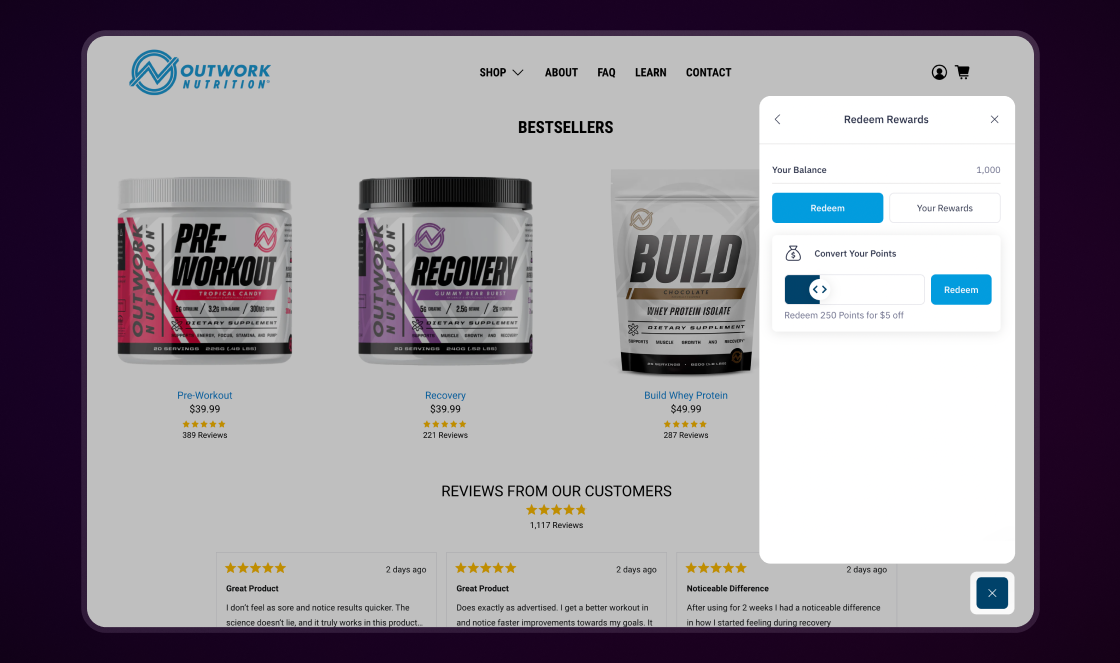
- Customer Marketing
- Reviews and UGC
- Social Proof
How To Add Social Proof on Shopify
Katie Vaught | Apr 25, 2025
Nov 18, 2024 | 13 minute read

Megan Wenzl
Content Marketing Manager
Here are the top customer marketing strategies (with examples) for health and wellness ecommerce brands. These include leveraging user-generated content, implementing referral programs, and creating compelling loyalty programs that harness your Superfans.
In the dynamic and ever-evolving world of health and wellness, ecommerce brands are navigating a market that’s rapidly expanding, with projections to reach an astounding $8.5 trillion by 2027. Standing out in this crowded, competitive space requires a nuanced approach, one that centers around customer marketing tailored to the evolving needs of today’s consumers.
This approach hinges on transforming customers into Superfans – customers who are highly engaged with your brand. This concept is pivotal today because it’s built on the pillars of trust and authenticity. Superfans are instrumental in amplifying your brand’s visibility and awareness through powerful mediums like word-of-mouth marketing and user-generated content, significantly boosting the financial performance of your business. From increasing lifetime value (CLTV) to fostering cost-efficient customer acquisition, and fortifying resilience in times of economic uncertainty, Superfans are key drivers of long-term, sustainable growth.
In this blog, we’ll explore a range of effective customer marketing strategies for health and wellness brands – from leveraging user-generated content and implementing referral programs to creating compelling loyalty programs that harness your Superfans. These tactics are not just theoretical but practical pathways for health and wellness ecommerce brands to achieve remarkable success in the year 2025.
In today’s digital marketplace, where consumers face an overwhelming array of choices, product recommendation quizzes have emerged as a critical tool for direct-to-consumer (DTC) ecommerce success. These interactive quizzes act as a bridge connecting customers’ preferences with your store’s offerings. By leveraging data-driven insights and customer behavior analysis, quizzes guide customers on a personalized journey, helping them discover products that perfectly align with their unique profiles.
Here’s a closer look at why quizzes have become a crucial piece of any ecommerce marketing strategy:
Creating an effective Shopify product recommendation quiz involves several key steps to enhance customer engagement and drive conversions:
To get up and running with a quiz fast, just in time for the beginning of 2025, create personalized, educated shopping experiences with an AI quiz builder like Okendo Quizzes’ Generative AI feature. This saves you time to focus on how the quiz looks to best personalize your marketing campaigns.
Utilizing AI to quickly and efficiently build a quiz is easy. When building a quiz, enter the name of the quiz and a list of products. These products will inform the AI model about your store, and will then generate relevant questions and recommendations to automatically build a quiz in just 1-2 minutes.
An important reason to implement a quiz fast is to capture the attention of shoppers coming to your store at the beginning of the new year looking to achieve their health goals. You can ask questions like:
By incorporating quizzes into your marketing strategy, you can bridge the gap between customer preferences and product offerings, enhancing the shopping experience, boosting conversions, and fostering customer loyalty.
DeltaG uses Quizzes to create a personalized shopping experience for their customers. With their quiz, which is promoted on their homepage for maximum distribution, DeltaG can offer an engaging and dynamic journey that makes finding the perfect product that addresses the customer’s needs an easy and frictionless experience. The quiz shows shoppers the Ketone Category that is best for them, such as Cognition & Focus.

Referral marketing is a cost-effective and powerful tool for customer acquisition and retention. Statistics indicate that customers acquired through referrals have a 16% higher lifetime value compared to non-referred ones.
A customer referral program works by offering attractive rewards to your customers in exchange for recommending your brand to friends and family. You can ask any customer to join your referral program, but your most loyal customers are most likely to refer a friend or family member. You can identify your loyal customers by looking at their purchase history or data obtained through reviews and surveys. The referral sender, or the loyal customer, is provided with their own unique referral link to share with recipients. Once the customer’s referral recipient clicks the link that is shared, the recipient receives a reward, such as a percentage off their purchase. The recipient then makes their first purchase with the reward.
After the recipient makes the qualifying purchase, the referral sender also gets rewarded. This reward applies to future purchases, which incentivizes the customer who referred your brand to purchase from you again. The repeat purchase helps increase their customer lifetime value.
This helps your brand acquire new customers, while keeping loyal customers happy, further strengthening customer relationships.
An excellent example of a health and wellness brand leveraging referrals is The Collagen Co., which is on a mission to help customers feel confident, radiant, and unstoppable through the transformative power of Collagen. The brand successfully harnesses its loyal customer base by sending out referral requests. These requests often include incentives for both the referrer and the referee, such as discounts or special offers on future purchases. This strategy capitalizes on the trust and satisfaction already established with existing customers, encouraging them to share their positive experiences with friends and family.

By systematically encouraging and rewarding referrals, The Collagen Co. not only expands its customer base but also reinforces its relationship with existing customers. These ‘Superfans’ play a crucial role, acting as brand ambassadors who provide genuine, trustworthy endorsements. This approach not only drives sales but also builds a community of loyal customers, which is invaluable in today’s competitive market.
As Nicole Mitrov, Digital Content Manager for The Collagen Co. says, “Okendo Referrals is easy to use, highly customizable, and the setup only takes minutes. We’ve seen 20x ROI and 9.7% conversion rate in just one month of launching the program.”
In the health and wellness industry, the importance of reviews cannot be overstated. This sector, more than many others, relies heavily on trust and credibility. Health and wellness products often promise significant benefits to consumers’ well-being, making potential customers particularly cautious and discerning. In this context, customer reviews serve several critical functions:
While having a reviews program is essential for the above benefits, there are ways to enhance your program to further maximize its value with a reviews platform like Okendo:
Love Wellness, a subscription-based wellness company for women, effectively utilizes Okendo to generate and showcase high-quality reviews at various stages of a customer’s journey. Love Wellness showcases reviews on its PDPs, with reviews displaying the customer’s age and what health issue the product the customer bought helped with (such as skin irritation). They offer customers attribute filtering in addition to free text search to help them find exactly the information they need to make a confident purchase.

Amanda Kwasniewicz, VP of Customer Experience at Love Wellness, emphasizes the importance of understanding customer satisfaction not just after the first purchase, but also over an extended period. By deploying Okendo, Love Wellness has nearly doubled its order-to-review rate within eight months, illustrating the platform’s efficacy in garnering customer feedback. The ease of use of Okendo, both on the front and back end of their website, and the fact that it doesn’t slow down their site speed, contributes to its successful integration into Love Wellness’s strategy.
Tailoring content and offers to individual customers can significantly enhance engagement and brand loyalty. By utilizing customer data gathered from reviews, surveys, and quizzes, brands can deliver personalized content such as event invitations or educational materials about health and wellness. This data-driven approach allows for a deeper understanding of the customer’s health challenges, enabling brands to offer products and solutions that are truly relevant.
Women’s Wellness brand, Winged Wellness, is another great example of how brands can use feedback collected from Surveys, Quizzes and Reviews. When leaving a review about the brand’s sleep support gummies, customers are asked what they struggle with, including “Staying Asleep”, “Quality Sleep” and “Physical Discomfort”.
Customer data in the form of attributes can be helpful in product-launch campaigns. For example, if a customer says they struggle with sleep in a review, then you can send them a personalized product recommendation about a new sleep product you just launched 6 months later.

Loyalty programs play a vital role in boosting retention through ongoing and high levels of engagement. By implementing a loyalty program, you can set your health and wellness brand apart in a competitive market and reward your loyal customers, encouraging their retention and advocacy. This fosters enduring customer relationships, leading to increased customer lifetime value. Research from Okendo indicates that 77% of customers are more likely to remain loyal to brands with loyalty programs.
Here are the top reasons to incorporate a loyalty program into your customer marketing strategy:
A great example of a health and wellness brand that implemented a loyalty program created specifically for their customer base is Outwork Nutrition. The brand makes science-based supplements to support customers’ training goals without overhyped promises or exaggerated claims.
After gathering customer feedback about a loyalty program, the Outwork Nutrition team recognized the importance of integrating the ideal program into the customer experience to meet expectations effectively. The brand successfully built a loyalty program where customers get $1 for every 50 points they earn.
One way the brand makes operations more efficient is by consolidating its Reviews and Loyalty programs seamlessly. The simplicity of their loyalty program boosts customer engagement, turning loyal customers into Superfans of the brand by taking actions for more than purchases, such as leaving a review or following the brand on Instagram.

In addition to why loyalty programs are a must for your customer marketing strategy, it’s also important to make sure your program is personalized for your customers. Here’s how to create an engaging program designed for your customers:
In 2025, health and wellness ecommerce brands can achieve remarkable success by adopting customer-centric marketing strategies, focusing on transforming customers into ‘Superfans’ – advocates who actively promote the brand. Utilizing tools like Okendo’s customer marketing platform, these brands can offer personalized shopping experiences and gather valuable zero-party data, enhancing customer engagement.
This approach involves leveraging customer referrals, showcasing authentic reviews, and tailoring content to individual needs, as evidenced by the successes of fast-growing health and wellness brands. These strategies underscore the importance of integrating customer feedback into product development and marketing, ensuring that health and wellness ecommerce brands not only meet but exceed customer expectations in a rapidly evolving market.
Related articles
Ready to learn more?